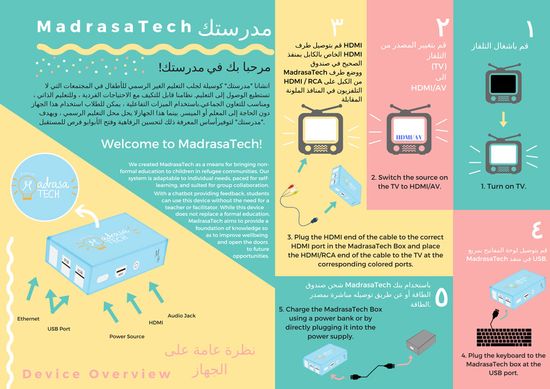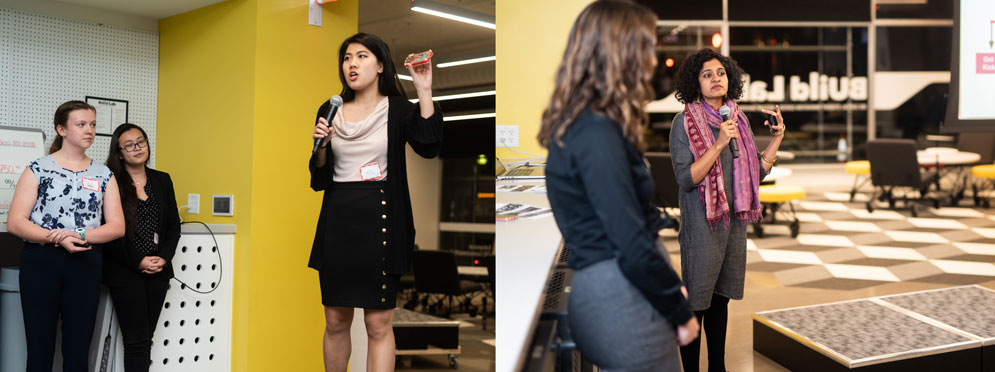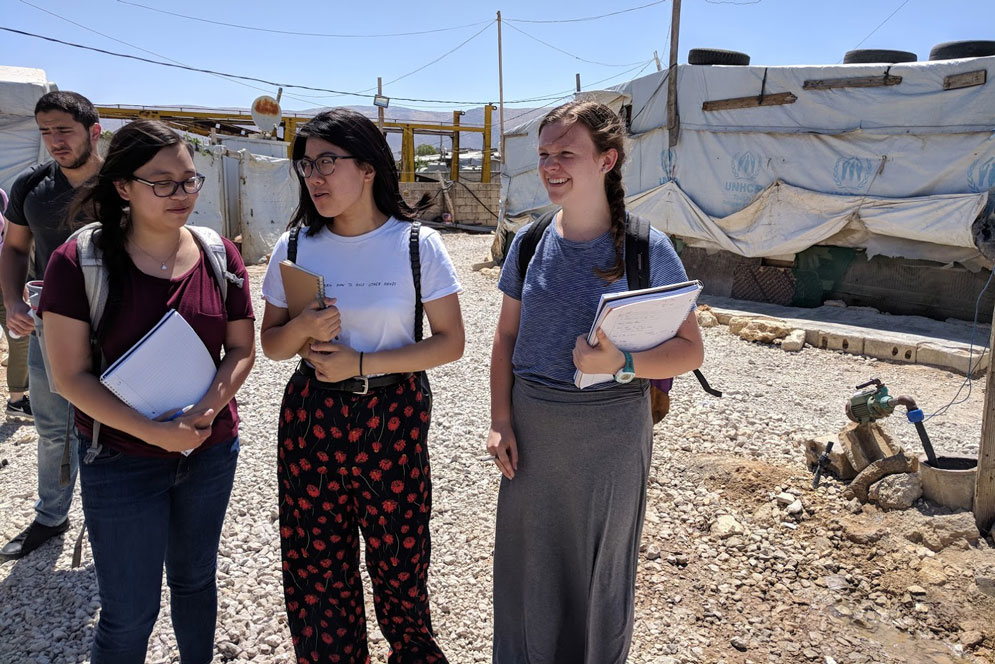BU Hult Prize Winners Aim to Bring Learning to Refugee Camps
Students take prize for start-up that uses a Raspberry Pi device
It’s a long way from Comm Ave to Bekaa Valley, but an idea pitched by three BU students to a select audience at the BUildLab Monday night could have a profound impact in refugee camps in Lebanon and beyond.
The start-up created by Jessica Thai (CAS’20), Sheila Phillips (CAS’20), and Misty Ouyang (Sargent’20), which could provide desperately needed education to refugee children around the globe, won the inaugural BU Hult Prize competition, hosted by Innovate@BU. It’s the first step in the three students’ goal to win this year’s Hult Prize, an annual competition for college students designed to generate start-up ideas that sustainably solve the world’s most pressing social challenges. Referred to as the Nobel Prize for Students, it provides $1 million in start-up funding to the winner. Their first-place finish in Monday night’s competition, with its $750 prize, advances Thai, Phillips, and Ouyang to a regional competition in Boston in the spring. Winning there takes them one step closer to the global finals at UN Headquarters next September.
The students’ start-up, MadrasaTech (“Madrasa” is the Arabic word for “school”), would allow refugee families living in camps with no access to education to turn the TVs in their tents into learning devices by way of a simple computer known as a Raspberry Pi. The three are currently working on prototypes. They call their goal “in-tent learning.”
They came up for the idea this past summer while they were in Lebanon for three weeks for a Humanitarian Engineering course that was part of the Program in Interdisciplinary Humanitarian Engineering and Refugee Studies (pHERS), supported by Kilachand Honors College, the College of Engineering, and the American University of Beirut. The trip included repeated field visits to the Saadnayel settlement in the Bekaa Valley, home to thousands of Syrian refugees. There the three women spoke with many families who emphasized the need for education. There was a school in the settlement at one time, but it was shut down because of funding and pressure from local officials.

“The kids themselves informed us how much they missed school,” says Thai. “One child mentioned how much he loved math and how much he missed learning the subject. The parents expressed to us their concerns for their children, not only because they weren’t getting educated, but also because they were becoming very restless. Most parents did not want their children playing with other children, because the restlessness often led to conflict, like physical fights between the children. For us, it seemed like providing education was not only beneficial for their academic success, but also for their mental health.”
The three founders saw that nearly every tent had a TV and that the kids watched cartoons all day because there wasn’t anything else to do. They hit upon the idea of creating a curriculum that could be transmitted via TV and would be focused on basic reading and math taught in Arabic, but would also teach the children the basics of English from lessons preloaded onto an SD card. The card could then be inserted into the Raspberry Pi, about the size of a deck of cards, which is mounted in a plastic box and equipped with a power connection (for recharging), an audio jack, and connectivity via Ethernet, USB and HDMI ports. With cables and a keyboard provided with the device, the children can simply connect the device to their TV and begin work on their lessons. Each device would cost less than $100 to build.
The three BU students split responsibilities: Ouyang focused on the education curriculum, Phillips on developing a business plan, and Thai on the project’s legal and administrative aspects. They are still working to develop a prototype and create the curriculum. For a Saadnayel settlement pilot project, they aim to begin with nine MadrasaTech devices, which their BU Hult competition win will help fund.
“One of the mothers we spoke with told us, ‘Don’t just show us an idea. Actually implement it,’” says Ouyang. “Seeing how hard she’d been trying to learn English so she could teach it to her children really touched us. Her words have remained with us, and we are very passionate about seeing our project to fruition.”
Operated by a network of in-tent leaders and on-ground coordinators, MadrasaTech won’t replace formal education, but can fill in where that is not available. Syrian refugees were previously taught subjects in Arabic in Syria, but Lebanon’s educational system is different, and certain subjects are taught in English or French. Over the summer, the team had a fourth member, mechanical engineer Muhammad Tuqan, who is currently studying at American University of Beirut and helped translate the manual and other material into Arabic.
While in Lebanon, the students had support from mentors at the American University of Beirut as well as from Muhammad Zaman, an ENG professor of biomedical engineering, and Carrie Preston, a College of Arts & Sciences professor of English and director of Kilachand Honors College.
The Hult Prize launched a decade ago, the brainchild of Ahmad Ashkar, a Hult International Business School MBA student who proposed a competition to generate start-up ideas from young people that would both make a profit and help solve critical social problems. The competition is now sponsored by the school in partnership with the United Nations and the Clinton Global Initiative.
The first prize was awarded in 2010, and since then each year’s competition addresses a specific challenge, such as clean water, energy poverty, the global food crisis, healthcare, and early childhood education. This year’s challenge was to create a venture that will provide meaningful employment for 10,000 young people within a decade.

Left photo: Phillips (from left), Ouyang, and Thai won the BU Hult Prize competition December 10 after pitching their plan to bring education to Syrian refugees living in Lebanon. Right photo: Priya Krishnamoorthy (MET’19) organized and also emceed BU’s first-ever Hult Prize competition with Mia Zhu (MET’20) (not pictured). Photos by Christopher McIntosh
BU’s first-ever Hult competition was organized by arts administration graduate students Priya Krishnamoorthy (MET’19) and Mia Zhu (MET’20), who heard about the competition early this fall and reached out to Innovate@BU for help organizing it and getting BU students involved. Metropolitan College funded the cash prizes. Some 16 proposals from teams of three to five students were winnowed down to six finalists by faculty.
The other finalists—all featuring an app or website as a key component—were:
- Firefly, which won the $500 runner-up and $250 audience choice awards for its plan to help non-STEM students succeed in the job market with the help of networking and mentors. The project already has 100-plus students involved in a pilot program.
- Favorit aims to be a sort of Uber for errands, with an app that puts together people who need small favors done with students who can perform them for a small fee.
- Maeven wants to disrupt the existing tutoring industry by putting dropouts, and others whose education has been sidelined, to work tutoring current undergrads. A three-month pilot program involved 150,000 users.
- Verto is an app for buying and selling used items—that lamp, that dorm fridge, whatever. Hundreds of students are currently using a pilot program here at BU.
- Healthy Gamer is the brainchild of three Questrom MBA students who want to bring healthcare and recovery coaches to video game addicts—online.
The judges commended the business plans and presentation of all six finalists, but said MadrasaTech showed the most promise in meeting this year’s Hult Prize goal of creating meaningful employment for 10,000 young people by providing education to those who would not otherwise get it. But one of the competition judges, Gerald Fine, executive director of Innovate@BU and an ENG professor of the practice, cautioned Thai, Phillips, and Ouyang that even with an education, jobs are hard to come by in Middle East refugee camps. On the other hand, he said, the device could be useful far beyond the Bekaa Valley, adapted to help underserved populations around the world.
The other competition judges were Tamika Jacques, director of workforce development of the Mass Clean Energy Center; Justin Kang, vice president of economic growth, Greater Boston Chamber of Commerce; and Kaitlyn Bea, senior program associate, SkillWorks, at the Boston Foundation.


Comments & Discussion
Boston University moderates comments to facilitate an informed, substantive, civil conversation. Abusive, profane, self-promotional, misleading, incoherent or off-topic comments will be rejected. Moderators are staffed during regular business hours (EST) and can only accept comments written in English. Statistics or facts must include a citation or a link to the citation.